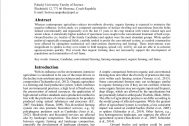Obsah
Whereas contemporary agriculture reduces invertebrate diversity, organic farming is expected to minimize this negative influence. In this study, we compared communities of surface-dwelling soil macrofauna from the fields farmed conventionally and organically over the last 15 years in the crop rotation with winter oilseed rape and winter wheat. A statistically higher number of specimens were caught in the conventional treatment of both crops. Ground beetles (i.e. beetles of the family Carabidae) and spiders were the most abundant groups. While spiders preferred organically managed fields, carabids tended to prefer the conventional system, as carabid communities were affected by springtime mechanical soil interventions (harrowing and hoeing). These interventions were insignificant to spiders as they over-winter in field margins, spread very well by air and are able to re-colonize agroecosystems quickly. This reveals that organic farming does not necessarily support the development of populations and communities of soil fauna.



